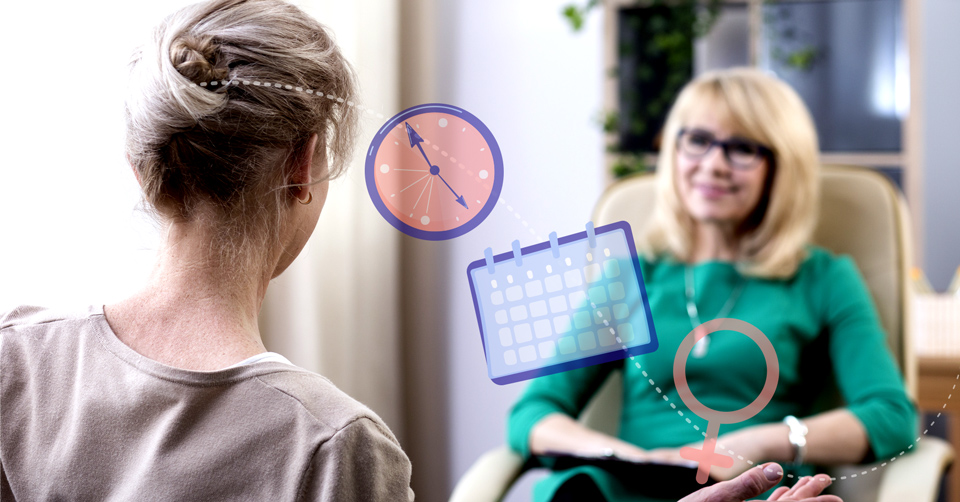Head of Sales at Practice Plan, Zoe Close, speaks to Practice Manager and President of ADAM (Association of Dental Administrators and Managers), Lisa Bainham, about their shared experiences of the Menopause and to find out how she helps others in similar circumstances.
Zoe: What sort of practical changes have you made within your practice Lisa, to help support any of your team members who may be going through perimenopause or menopause?
Lisa: My team is very open with me, so we have conversations all the time. We have an option for our team to go to a therapist that we pay for. There are lots of free resources out there which we signpost people to, but if they do want to go and have some counselling, then that’s open to them. We’re not there to diagnose them. We have information available so they’re aware of where they can get help if they want to access it. Everyone will deal with things differently. So, there’s no one size fits all.
It’s important as a manager and leader of your team to understand the different personalities and adapt your responses to suit them. But we should make our team aware of small changes that can be made for them. One of the issues that can be quite tricky is temperature control. This does lead to open conversations in my practice, which thankfully, are usually light-hearted.
If we have a clinician who’s suffering with hot flushes then they may need fans and so on to keep cool but the nurses, for infection prevention and control, can’t wear long sleeves and they may be freezing. So, we do have to look at rotas sometimes and try to tailor who works with whom.
It’s not just about temperature though, we have lots of considerations. It might be that people need more breaks. If you have reception team members that are going through the menopause, we have to consider their comfort because of some of the lesser-known symptoms such as electroshocks. This is where you get pins and needles in your fingers or shooting pains in your head. They can be made worse by sitting in front of a computer all day. So, it’s important to make sure that the team are getting enough breaks. They don’t need to be officially scheduled breaks, it’s more about checking in with each other and being able to take five when it’s needed.
In my practice we also introduced what I call my bathroom buffet. It’s a box of goodies in the bathroom such as deodorants, face wipes, hairspray, dry shampoo; things to make people feel a little better or to freshen up.
For me, supporting people is mainly about making sure that they are okay and that they feel comfortable saying, ‘look, I need a break, I’m struggling’, and making sure that we are aware of some of the more unusual symptoms that can affect them.
Zoe: There are so many of them. More than thirty I believe. I can relate to the air con situation though. We often have team meetings where we have some people fanning themselves as they’re so hot and the air con is on full blast while others in the team just kindly put their coats back on. We’ve even had people bringing blankets in, which is so kind. Because when you are experiencing that hot flush, not only does it make you hot but it makes you feel uncomfortable too. It can also affect your confidence. You feel you look different; you’re starting to perspire, you can’t remember things and it can make you really agitated. I’ve been grateful when people have not insisted that they turn the aircon off. They’ve just made themselves warmer. So, I feel I’ve been very lucky.
Lisa: That’s good. Also, it’s important to get the men in the team to appreciate these things. The men in my practice are great. We did encourage them to speak up as well and give us their views. Their experience was of mums or sisters, but they’re not working with their mums and sisters. I found the talk was quite jokey, not rude or insensitive but diverting rather than facing it head on and saying, ‘this must be pretty awful for you’. And it is. So, let’s all just be empathetic towards each other.
Zoe: That’s all you need from people sometimes is for them to say ‘it must be awful. I’m so sorry you’re going through this, and I’ll try to understand.’ That’s all anyone can do, isn’t it? But it goes a long way. Thank you for your insight Lisa.
About Lisa
Lisa Bainham is involved in all aspects of the practice, including, compliance, accounting and business development. Lisa was awarded Practice Manager of the Year 2016 at the Dental Awards, Best practice UK & Best Patient Care UK and is now a Judge. Lisa’s knowledge and experience over her last 25 years enables her to support other practice managers in her role as President of The Association of Dental Administrators and Managers, who have members throughout the UK. She speaks at a wide range of Dental Events and covers a wide range of topics including, Leadership, Team Building, Complaint handling, Customer Service, patient journey training and her PM mentorship programme. Lisa also provides support to practices across the UK & Ireland through her consultancy, Practice Management Matters. Lisa still works in practice, making her relatable and empathetic to the challenges many practices face.


